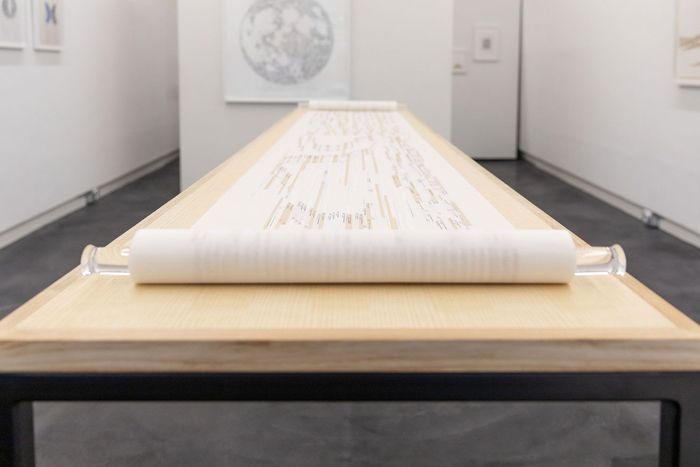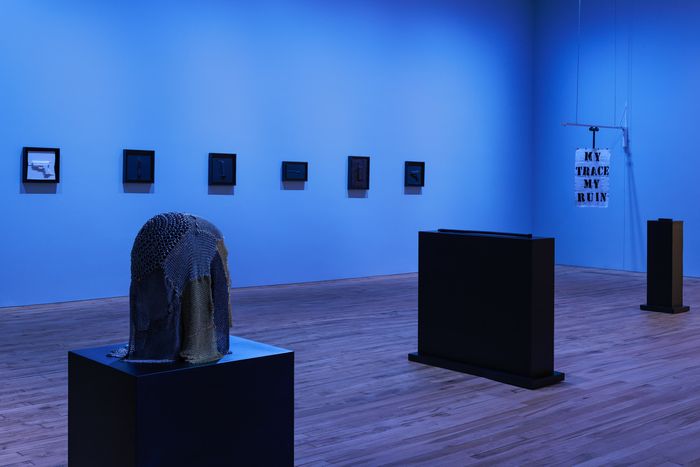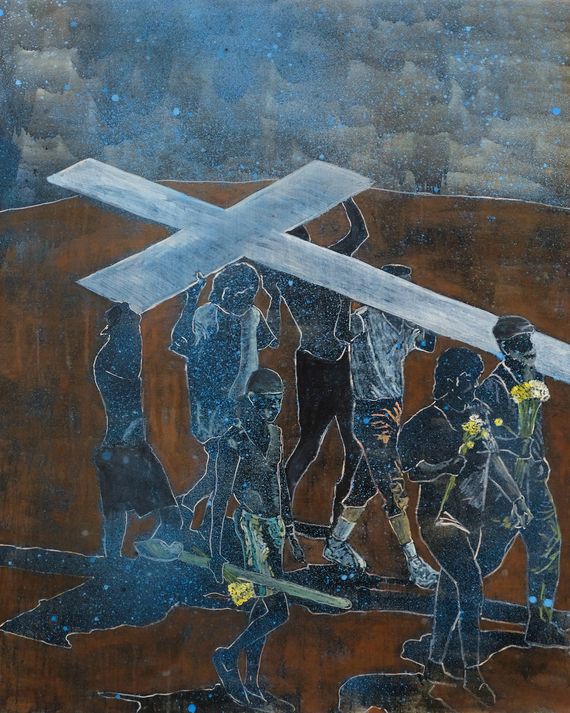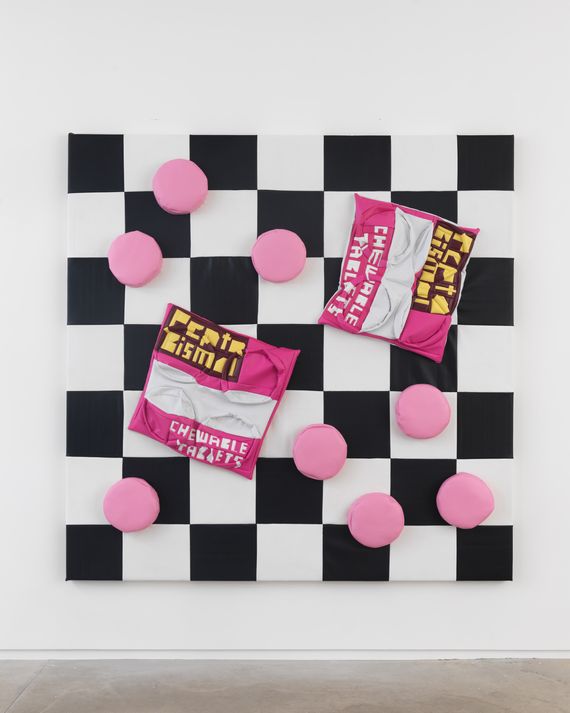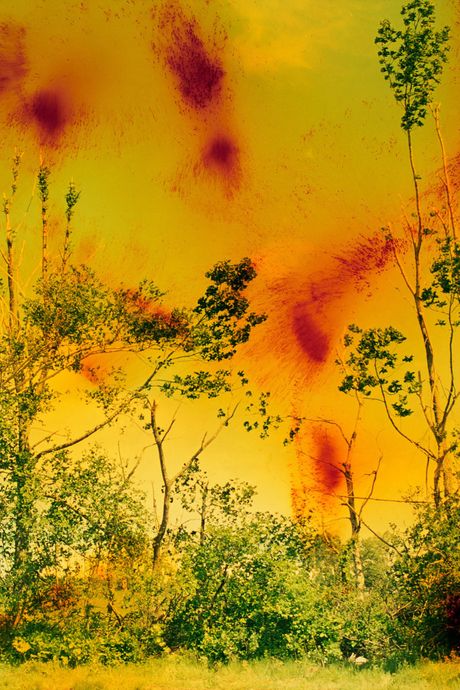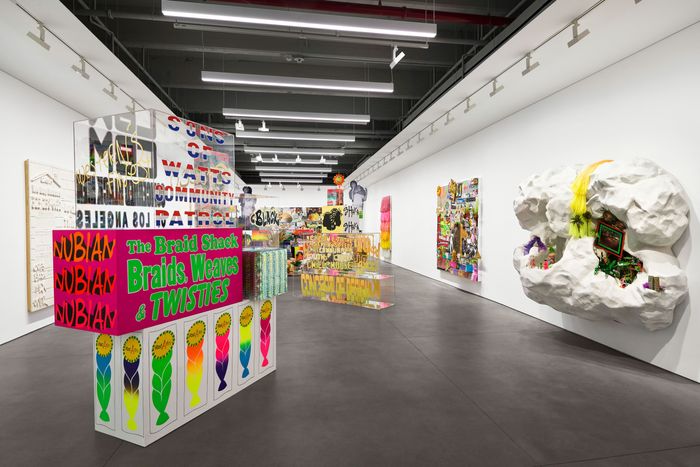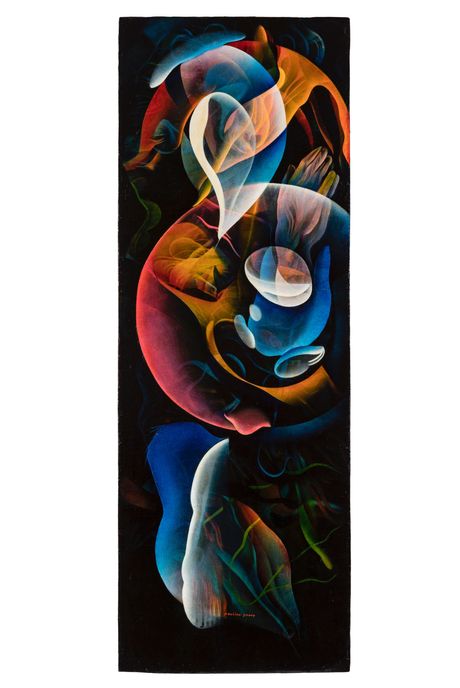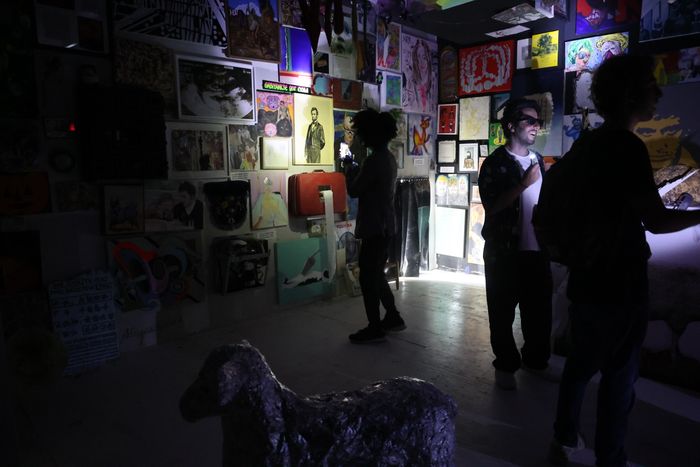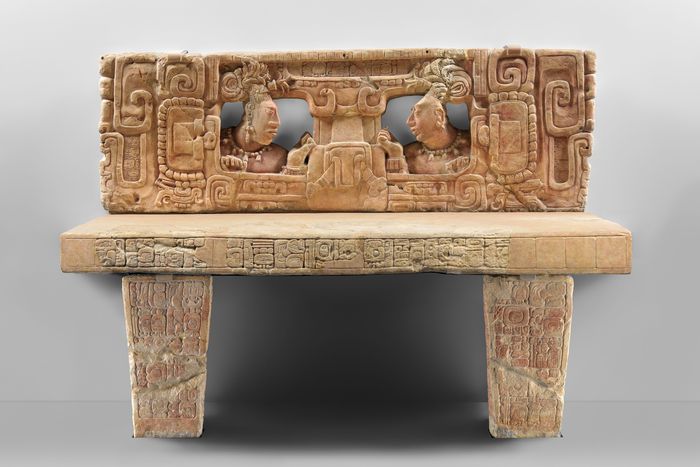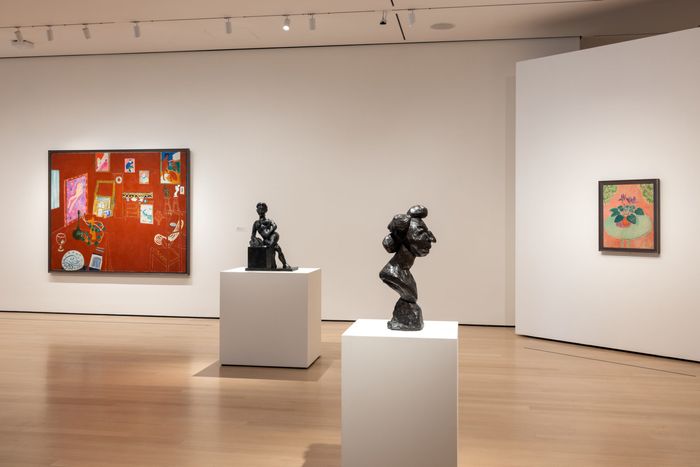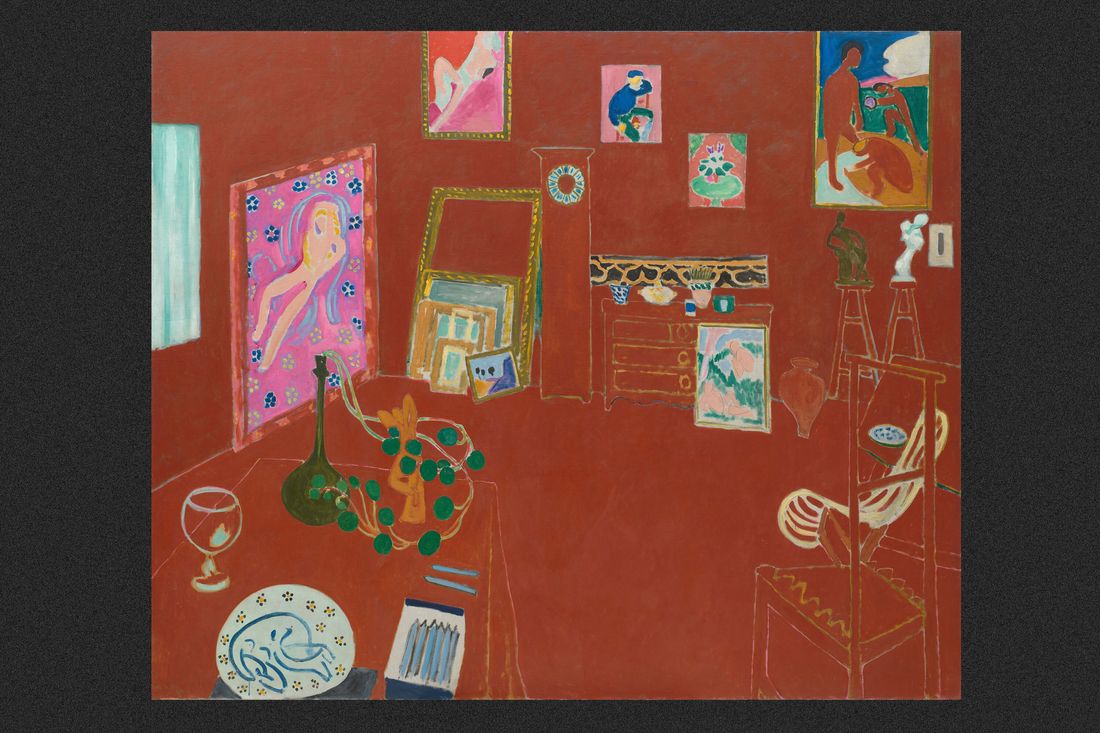
Art still thrills. This year, as I saw more and more work by artists who’ve long been underrepresented — more women, more so-called outsiders — I felt an uptick in excitement. And we’re revisiting stories too, like Matisse’s optic wonder The Red Studio. For art lovers willing to pore over as much as possible, 2022 shone its ever-loving light on us.
10.
Yu-Wen Wu, Walking to Taipei, Independent Art Fair
I saw this large work in Praise Shadows’ booth at the Independent Art Fair: a long scroll of tiny cutout texts, place names, and mileage markers. Then I looked at the title, Walking to Taipei, and instantly seemed to enter the realm of Borges or Herzog. This Boston-based artist, unable to visit her grandmother, Googled how to get there — and got a set of 2,052 walking directions. (Strangely, she was never able to get this search result again.) I saw the mysteries of the algorithm transmuted by an artist’s diasporic yearning to return home, see loved ones, traverse distances, and celebrate in the company of family.
9.
Tiona Nekkia McClodden, “MASK/CONCEAL/CARRY,” 52 Walker
This standout from the 2019 Whitney Biennial came into her full powers in a show at the excellent new gallery 52 Walker. On hand were paintings based on patterns tracing a guns’ ammo-less firing, videos of the artist walking with a gun tucked into her waistband, and a monochrome work made of black leather with the imprint of the clip from an AR-15 assault rifle embedded in it. Also on hand was a kind of chain-mail headdress, which seemed to raise the dead or act as protective guardian; I saw it as a kind of magic helmet, in the vein of Richard Wagner’s Tarnhelm — a supernatural object in Der Ring des Nibelungen that allows the wearer to change their form. This show had that kind of power.
8.
“no existe un mundo poshuracán: Puerto Rican Art in the Wake of Hurricane Maria,” Whitney Museum
After the monster storm tore Puerto Rico apart in 2017, here came one of the first major New York museum exhibitions devoted solely to work about the island and made by the diaspora. (Following, of course, the groundwork laid by the great El Museo del Barrio.) Some standouts included Sofia Córdova’s film that contrasted scenes of daily life on the island with the ghost life after the storm; Danielle De Jesus’s work combining the 1937 Ponce massacre with 2019 protests calling for the resignation of Puerto Rico’s governor; Gabriella Torres-Ferrer’s 2018 work Untitled (Valora tu mentira americana), a blown-over streetlamp; Javier Orfon’s words and pictures scratched into cupay leaves; and Miguel Luciano’s Shields/Escudos, made by painting black-and-white Puerto Rican flags on pieces of decommissioned school buses. In this show, I gleaned the constant back-and-forth of independence and statehood movements, the problems of government corruption, and the richness of creative force that seems to underlie and transcend all of this.
7.
Al Freeman, 56 Henry
Amid her brightly colored bulbous, saggy wall works made of sewn-together soft materials like vinyl and foam, Freeman showed here a series of large still lifes that were actually floor lifes. These wall-mounted quiltlike works depicted items you might find looking down: packets strewn on black-and-white-checkered tile, torn-up lottery tickets, pennies on the sidewalk. Freeman packs this detritus of modern life with aggressive physicality, imparting the spatial tectonics of Cubism and trompe l’oeil.
6.
Wolfgang Tillmans, “To look without fear,” MoMA
Tillmans’s show is a walk-in book of hours of a life in photography. No one has captured the everyday nothing of sweet life, club kids, still lifes, protest marches, and abstract images better than Tillmans. He not only changed what photography looks like, making it more compositionally casual, he has an almost mythological feel for his subjects. A ferocious mind giving dignity to everything he sees.
5.
Lauren Halsey, David Kordansky Gallery
Walking in the door of the brand-new Chelsea location of this L.A. gallery, one felt the spirit of chaos, the life of the street, miracles of color, and an artist who commands a sorcerer’s ability to commandeer found materials. Halsey makes wall works and installations that elucidate, celebrate, and make her neighborhood, South Central L.A., into a magic carpet ride of optical possibility. I imagine Halsey going on to great things in large spaces.
4.
Paulina Peavy, Andrew Edlin
The same magnificent art-historical rediscovery machine that helped place Hilma af Klint at the center of modernism turned over another stone these last few years to find the early-20th-century paintings of the underappreciated West Coast artist Paulina Peavy, who died in 1999. As with af Klint — who claimed she’d had a close encounter with a supernatural being — Peavy told people that, after a séance, she’d met a UFO named Lacamo. This inspired her to commence a kind of florid, lunar-colored, automatic painting that resulted in psychedelic fracturing compositions, interweaving biomorphic abstractions, and, most amazingly, masks, which she sometimes wore while painting. Her work shows us a tremendous undiscovered country. In an excellent three-person show alongside work by Ann McCoy and Olga Spiegel, Peavy threw down a gauntlet that museums better pick up before she gets too sought-after.
3.
“The Patriot,” O’Flaherty’s
In this wild show, hundreds of pieces were hung cheek-to-jowl in this gallery in a small storefront then in Alphabet City — the result of an open call that promised anything delivered would be installed. The exhibition was a tour de anarchic energy overseen by gallery co-founder and artist Jamian Juliano-Villani, who stated that she wanted to “show art that is not afraid of itself” and that this would be a space that treated everyone “equally like shit.”
2.
“Lives of the Gods: Divinity in Maya Art,” Metropolitan Museum of Art
This mind-blowing exhibition gathers together rarely seen archaic works of Mayan art. We see ambitious large stone carvings that usher viewers into rooms full of sophisticated and dazzling ideas of figuration, space, worship, the afterlife, and the power of form. The hair on the back of my neck stood up as I gaped, almost gasped, at incredible headdresses, figures that seemed to behold ghosts, mythical creatures, humans communing with spirits. A cosmos of watching carved faces.
1.
“Matisse: The Red Studio,” Museum of Modern Art
Matisse’s The Red Studio is a one-painting rebellion against illusionistic perspectival space, a gigantic shove off the cliff of the possibilities of color. This condensed exhibition brought together Matisse’s 1911 work — which depicted his own studio — with many of the actual paintings he included in the image, creating a hall-of-mirrors look into the inner sanctum of the artist. Best of all, this exhibition was a lesson in sheer painterly gall: The Red Studio was a commission for one of Matisse’s most important patrons. The artist must have seen that the painting could be much more; before sending it off, he covered most of its surface in Venetian red. The collector rejected it, but Matisse had already crossed an aesthetic Rubicon. This small MoMA show showed how much a museum can do at a smaller scale, without all the bells and whistles.
More From This Series
- The Best Books of 2022
- Which TV Cancellation Hit Hardest in 2022?
- The Best Movie Performances of 2022


